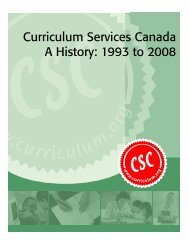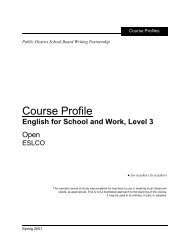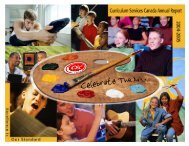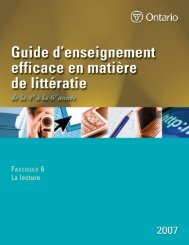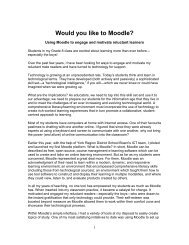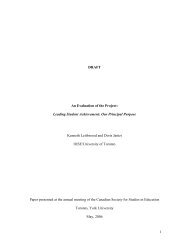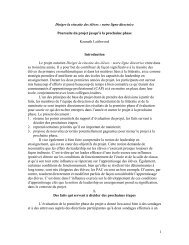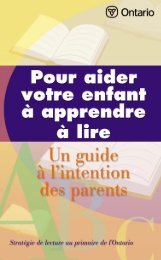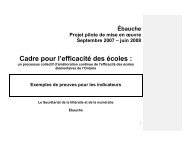Course Profile - Curriculum Services Canada
Course Profile - Curriculum Services Canada
Course Profile - Curriculum Services Canada
Create successful ePaper yourself
Turn your PDF publications into a flip-book with our unique Google optimized e-Paper software.
The Final 30% Examination<br />
Students of SCH4U need to be properly prepared success in university science courses. Study skills,<br />
including chunking of content, use of different graphic organizers, and preparation of study sheets,<br />
should be integrated into a number of lessons. Multiple-choice questions should be used as one of a<br />
variety of ways of evaluating a wide range of expectations. Students should experience all types of<br />
questions throughout the course and be taught strategies for answering them.<br />
Students would benefit from more than one opportunity to complete an examination. Should a mid-term<br />
examination be administered, an opportunity for feedback and reflection should be provided.<br />
The Final 30% Evaluation design must allow for evaluation to occur within all four categories.<br />
Examination questions should be equally distributed across the course units, and consideration should be<br />
given to a range of question types, such as multiple choice, short and extended answer, laboratory-based<br />
and higher-order questions. The written examination could stress Knowledge/Understanding and Making<br />
Connections while the Performance Task could focus on Inquiry and Communication Skills. There must<br />
be a balance of data from the four categories on the Achievement Level Chart, spread over both the<br />
Written Examination and the Performance Task.<br />
Accommodations<br />
Students with special needs, whether identified formally or not, need additional supports to succeed in<br />
Grade 12 Chemistry to their full potential. Teachers should consult individual student IEPs for specific<br />
direction on accommodation for individuals. The following are examples of accommodations and aids<br />
that may be helpful in a general way. Where there are specific accommodations required in an activity,<br />
the suggestions are noted within the activity.<br />
• Check the IEPs of identified students for specific modifications in teaching methodologies and<br />
evaluation.<br />
• Ensure that peer helpers are available when students are working in small groups.<br />
• Provide handout sheets with sample calculations and specific skill instructions.<br />
• Help students create data charts into which they record information.<br />
• Advise special education staff in advance when students who require their support are working on<br />
major assignments.<br />
• Advise ESL/ESD staff in advance when significant written work is required.<br />
• Have students keep a science dictionary of terms using pictures and first language words.<br />
• Permit the use of a translation dictionary on assessments.<br />
• Record key words on the board when students are expected to make their own notes.<br />
• Allow students to report verbally to a scribe (teacher or student) who can then help in note making.<br />
• Utilize student strengths by permitting them a wide range of options for recording and reporting their<br />
work, e.g., drawings, diagrams, flow charts, concept maps.<br />
• Extend timelines to give students more time to process language and put their thoughts into words.<br />
• Give readings in advance to students or provide a selection of materials at different reading levels.<br />
• Provide extended timelines in situations where students do not have access to computers outside of<br />
school.<br />
• Provide additional time on assessments for dictionary use and processing language.<br />
• Provide resources with appropriate reading level when research is required.<br />
Page 23<br />
• Chemistry – University Preparation



